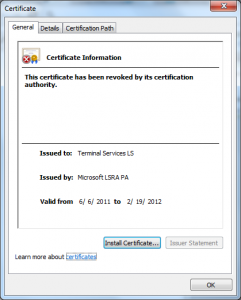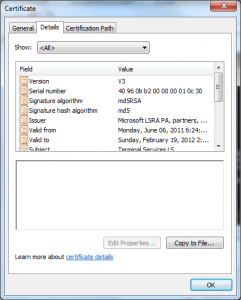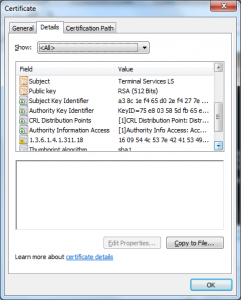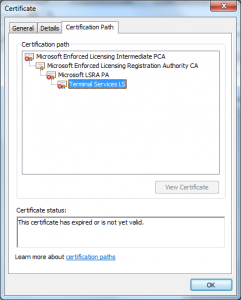When looking at the certificates the Flame authors used to sign the malware in their Windows Update module one has to wonder what was different between a normal terminal services license certificate and the one they used.
Well getting at one of these certificates is a little awkward as they are kept in the registry vs. in the traditional certificate stores, thank goodness with a little due diligence you can find one.
 |
 |
 |
 |
So from this what can we learn? There are a few things:
- Every subordinate CA has the same name “Microsoft LSRA PA”
- Every terminal services license has the same name “Terminal Services LS”
- The license appears to have a random serial number (even the CA certs did not!)
- The license has a 512bit RSA key.
- The license is signed with MD5.
- No restrictions have been explicitly placed on this certificate.
- This license is good for 257 days.
- The CRL url is invalid.
- The Certificate Issuer url is invalid.
- It contains a proprietary extension (1.3.6.1.311.18)
As far as best practices go there are clearly a lot of problems here:
- Same name for every CA – the point of a CA is to identify an entity, if every CA has the same name this can’t really happen.
- Same name for every subject – while the certificates here are for authenticating entitlement to make a connection and not to authenticate an identity the subject should still be unique.
- Over entitled– The certificate contains no Extended Key Usage or other restrictions, as a result this certificate is only as restricted as its issuers issuer is, namely it is good for:
- Code Signing (1.3.6.1.5.5.7.3.3)
- License Server Verification (1.3.6.1.4.1.311.10.6.2)
- Weak keys – RSA 512 bit was factored in 1999, there should be no CA issuing 512 bit keys period especially in a PKI as powerful as this, especially for one that is good for code signing.
- Weak hash algorithm – MD5 has been known to be weak since 1993 and has had increasingly effective attacks published against it ever since — There should be no CA issuing MD5 signed certificates in 2012.
- Invalid URLs – This indicates that the CA was not actively managed, it also included internal only file references in the certificate also a no-no and a indicator of the same.
- Poorly thought out proprietary extension – The extension is not well thought out, the OID (1.3.6.1.311.18) is an arc for Hydra (Terminal Services) and not a unique identifier (or shouldn’t be at least) for a specific extension. This isn’t harmful but a signal the design didn’t go through much review.
The other items are odd, like the 257 day validity window and the proprietary extension but they are not problematic – at least on the surface.
Well that’s what we know so far.
Pingback: La creación del certificado falso usado por TheFlame, ridiculiza la estructura PKI de Microsoft (I) | Capitan Crunch